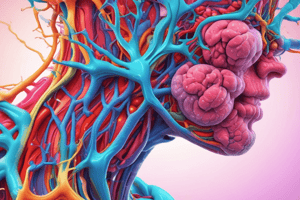Podcast
Questions and Answers
What distinguishes endocrine glands from exocrine glands?
What distinguishes endocrine glands from exocrine glands?
- Exocrine glands are ductless.
- Exocrine glands release their products directly into the blood.
- Endocrine glands secrete hormones. (correct)
- Endocrine glands have ducts.
Which of the following statements about hormones is true?
Which of the following statements about hormones is true?
- Hormones can cause disorders when in excess or deficiency. (correct)
- Hormones regulate activities at their site of production.
- Hormones only target nearby organs.
- Hormones are secreted into ducts.
What type of glands are salivary and gastric glands classified as?
What type of glands are salivary and gastric glands classified as?
- Exocrine glands (correct)
- Endocrine glands
- Hormonal glands
- Ductless glands
Where do endocrine glands release their secretions?
Where do endocrine glands release their secretions?
Which of the following is NOT a function of hormones?
Which of the following is NOT a function of hormones?
Which of the following statements about exocrine glands is correct?
Which of the following statements about exocrine glands is correct?
What is a common characteristic of hormones?
What is a common characteristic of hormones?
Which type of gland can be located far from its site of action?
Which type of gland can be located far from its site of action?
What is a key difference in the secretion mechanism between exocrine and endocrine glands?
What is a key difference in the secretion mechanism between exocrine and endocrine glands?
Which type of secretion is produced by endocrine glands?
Which type of secretion is produced by endocrine glands?
Flashcards are hidden until you start studying
Study Notes
Exocrine and Endocrine Glands
- The nervous and endocrine systems work together to regulate organ activities and maintain homeostasis.
- Endocrine glands secrete hormones directly into the bloodstream without the use of ducts.
- Exocrine glands release enzymes through ducts to specific sites in the body.
Differences between Exocrine and Endocrine Glands
- Ducts: Exocrine glands have ducts for secretion; endocrine glands are ductless.
- Secretions: Exocrine glands produce enzymes, while endocrine glands produce hormones.
- Location: Exocrine glands are localized near their action sites; endocrine glands can be distant from their target organs.
- Examples: Exocrine glands include salivary and gastric glands; endocrine glands include the thyroid and adrenal glands.
Hormones
- Hormones are produced by endocrine glands, also known as ductless glands.
- They are released directly into the bloodstream and circulated throughout the body.
- Hormones exert their effects on organs or tissues that are different from where they are produced.
- Each hormone has specific target organs that regulate their function.
- Imbalances in hormone levels, whether deficiency or excess, can lead to various disorders in the body.
Studying That Suits You
Use AI to generate personalized quizzes and flashcards to suit your learning preferences.




